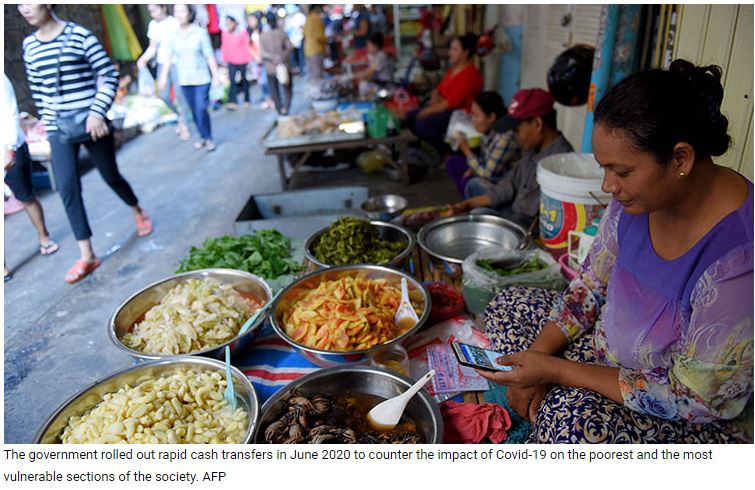Cambodia: $665M Covid-19 stimulus package mitigates impact
The Cambodian government’s stimulus packages of $665 million in total have mitigated the impact of Covid-19 pandemic on the country’s gross domestic product (GDP), unemployment rate, household income, consumption and poverty rate, according to a new research report.
The government rolled out rapid cash transfers for the first time in June 2020 among other stimulus measures to counter the impacts of Covid-19 by including 700,000 households which are among the poorest, the most vulnerable and the most impacted by the pandemic into the Cash Transfer Program for Poor and Vulnerable Households.
The intervention involved the transfer of $300 million as cash support for poor and vulnerable Cambodian citizens in 2020 through the use of the national IDPoor identification system, and an additional transfer of $365 million in 2021.
The cash transfer program has been implemented by the government with the support of the United Nations Development Program (UNDP), the Australian Department of Foreign Affairs and Trade (DFAT), and the Deutsche Gesellschaft für Internationale Zusammenarbeit (GIZ) GmbH.
Alissar Chaker, Resident Representative of UNDP Cambodia, said UNDP Cambodia and the General Secretariat for the National Social Protection Council (GS-NSPC) conducted a socioeconomic impact assessment of the above-mentioned social protection programme using three rounds of longitudinal surveys and econometric modelling techniques.
Bazlul Khondker, UNDP senior economic consultant, said in the report that the cash transfer intervention has been found to produce salutary impacts on growth, and the GDP growth rate may improve to -3.55 percent, an improvement of about 0.54 percentage points over the 2020 GDP growth rate of -0.41 percent without the intervention.
The simulated impacts for 2021 with cash transfer 2 suggest an improvement of around 0.45 percentage points over the 2021 GDP growth rate of 1.88 percent without the cash transfer intervention 2, according to Khondker, who added that Cambodia’s economy grew by 6.5 percent in 2019 during the pre-pandemic period.
“An increase in domestic production also leads to a rise in factor employment or use, and hence factor income or gross value added also known as gross domestic product,” he explained, adding that such a transfer increases household income and consumption that augments demand for goods and services, leading to rising production of domestic output.
“Such a direct transfer increases household income and hence consumption. This in turn augments demand for goods and services. The increase in demand for goods and services must be met by enhancing supply of goods and services,” Khondker pointed out.
“A major part of the supply increase should also be generated by increasing production of domestic output. An increase in domestic production also leads to a rise in factor employment or use, and hence factor income or gross value added also known as gross domestic product,” he said.
The unemployment rate was likely to improve to 4.2 percent under the cash transfer intervention 1 scenario from 4.8 percent in 2020 and in the case of 2021, it was likely to drop to 2.98 percent with cash transfer intervention 2 from 3.60 percent without cash transfer intervention 2, according to the report. A large number of workers are employed in low productivity, informal sectors, mainly in services and agriculture where their average working hours per week are low, according to the report.
The report titled “Socioeconomic Impacts of the Covid-19 Cash Transfer Programme in Cambodia: Micro and Macro-level Evaluation” adds that the average working hours per week were less than the 40-hour threshold, leading to high rates of underemployment. The estimated employment intensities across activities are high – suggesting that a decline in domestic output may spur the unemployment rate.
The report points out that the poverty rate, which could jump to 17.6 percent in the 2020 period in the absence of cash transfer interventions, is likely to decline to 11.2 percent with cash transfer interventions in 2021, which suggests around a 7.0 percentage point gain in poverty reduction with cash transfers.
“Both consumption and poverty impacts have been found to be favourable under the cash transfer intervention scenarios compared to scenarios without the cash transfers. In particular, cash transfers have augmented the incomes of poverty-stricken household groups such as the landless, small farmers, non-farm households, and low-educated households,” the report stated.
Chan Narith Under-Secretary of State of Ministry of Economy and Finance, said Cambodia’s policymakers, civil society, academia, and development partners are encouraged to build on these valuable insights in their efforts for reducing poverty and vulnerability, leaving no one behind.
“We hope that these empirical findings serve as critical evidence for building a strong case to further invest in social protection and for informing the Royal Government of Cambodia’s decision-making on the Kingdom’s future development model,” said Narith, who is also Secretary General of GS-NSPC.
Source: https://www.khmertimeskh.com/501122943/665m-covid-19-stimulus-package-mitigates-impact/


 English
English




